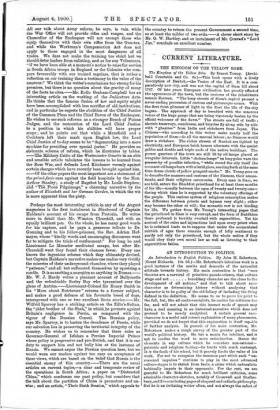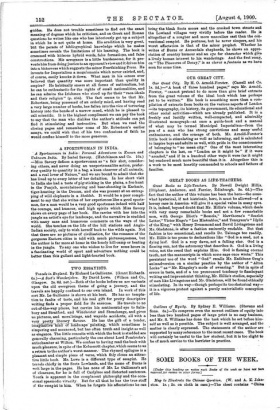AN INTRODUCTION TO POLITICS.
All Introduction to English Politics. By John M, Robertson. (Grant Richards. 10s. 6d.)—Mr. Robertson's laborious work is a good instance of the merits and demerits of the naturalist attitude towards history. His main contention is that "race theories are a survival of primitive pseudo-science, that culture stage and not hereditary character are the clues to the development of all nations," and that to talk about race- character as determining history without analysing that character is to be guilty of the old fallacy of including the thing defined in the definition. He seems to us to prove his point to the full, but, like all controversialists, he carries his criticism too far, and will not admit that this inexact mode of speech may b.sve 11 real meaning in an historieal.narrative which does not pretend to be merely analytical. A certain general race- character is a useful and correct explanation of many phenomena, provided we do not forget that this explanation is itself capi,,ble of further analysis. In pursuit of his main contention, Mr. Robertaon makes a rough survey of the greater part of the world's political history. He has a mania for intellect, and is apt to confine the word to mere ratiocination. Hence the elements in any culture which he considers non-rational- patriotic and religious feeling—he treats with much contempt. It is the fault of his school, but it gravely limits the value of his work. For not to recognise the immense part which such "un- reasoned impulses" continue to play in the most advanced culture-stages is to shrink from facts, a crime which naturalists habitually impute to their opponents. For the rest, we are grateful to Mr. Robertson for much brilliant criticism, some admirable character-sketches, notably of Cromwell and Shaftes. bury, and five concluding pages of eloquent and catholic philosophy. But he is an irritating writer often, and not always the safest of
guides. He does not trouble sometimes to find out the exact meaning of dogmas which he criticises, and on Greek and Roman questions be writes like one who has laboriously got up a subject in which he is not quite at home. His erudition is very great, but the parade of bibliographical knowledge which he makes sometimes reveals the limitations of his learning. The book is crammed with hideous hybrid words, false formations, and false constructions. His arrogance is a little burdensome, for it pre- vents him from doing justice to an opponent's view and it drives him into a bitterness which suggests the minor Freethinking Press. He invents for Imperialism a megalomania which never existed, and, of course, easily knocks it down. What man in his senses ever believed that quantity was more important than quality in empire? He habitually sneers at all forms of nationalism, but he can be enthusiastic for the rights of small nationalities, and he can admire the Irishmen who stood up for their "race-ideals and their religion" (p. 454). The fact seems to be that Mr. Robertson, being possessed of an orderly mind, and having read a very large number of books, has fallen into the vice of torturing history into the bonds of a narrow meed, which he is pleased to call scientific. It is the highest compliment we can pay the book to say that the man who dislikes the author's attitude can yet find it stimulating and instructive. But when we read the closing pages and remember some of Mr. Robertson's earlier essays, we could wish that of his two confessions of faith he would confine himself to the more generous.



































 Previous page
Previous page